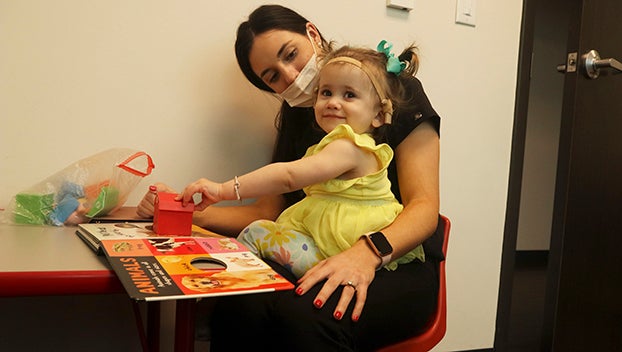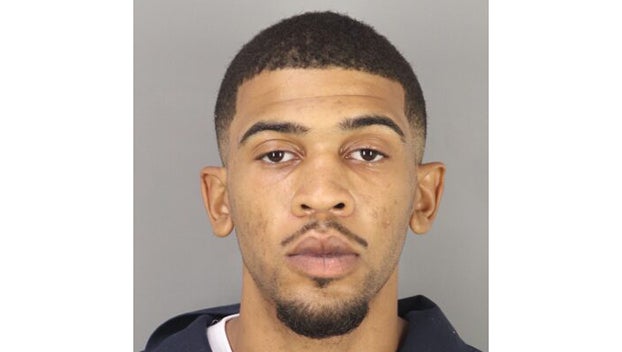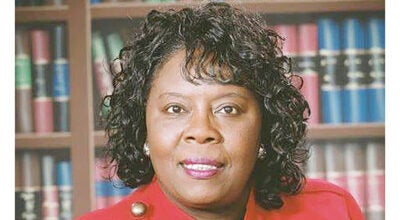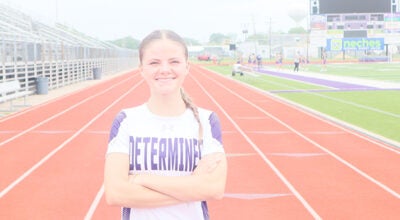Christus Outpatient speech therapy helping community members find their voices
Published 12:26 am Saturday, February 26, 2022
|
Getting your Trinity Audio player ready...
|
Twice a week, 1-year-old Birdie Shetley walks into Christus Outpatient Center on FM 365 for speech therapy.
Shetley was born with a virus that affected her hearing, causing her to need cochlear implants. While she is 17 months old, Shetley has had the ability to hear for more than half a year.
A few months after she was born, her mother Kalie Shetley realized her daughter was not responding to normal audible cues. After months of trying to find answers, doctors noticed Birdie had antibodies for Cytomegalovirus (CMV).
Birdie received cochlear implants in July and had them activated in August.
Now, she goes to regular speech therapy sessions at the outpatient center to help make up for lost time.
“She is making insane progress,” Shetley said. “When she got them, she obviously couldn’t speak at all. She really wasn’t understanding anything except for gestures.”
The real moment of joy came when Birdie said her first word.
“She said ‘mama.’ I took a video of it and started to cry,” Shetley said.
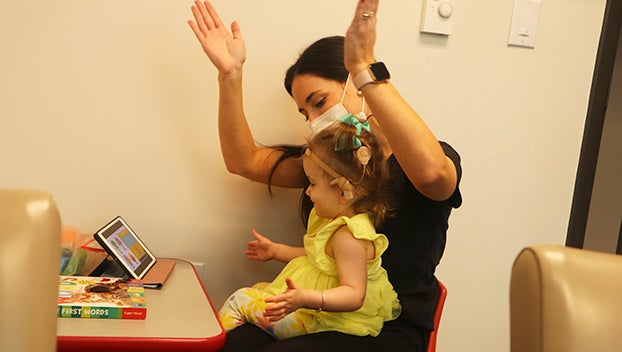
Makenzie Harris and Birdie Shetley do hand movements while they listen to songs during a speech therapy session. (Chris Moore/The News)
Her vocabulary is up to about two-dozen words, along with mimicking speech patterns.
“You can tell she is starting to understand and starting to put it all together,” Shetley said. “When you put her implants on in the morning, it is still a little shocking to her. She freaks out a bit and she gives a big bear hug. It takes a minute or two. Now, the only time she takes them off is if she is mad at you.”
Birdie attends 30-minute sessions with Speech Pathologist Makenzie Harris. The time is spent reading books and singing songs with hand gestures to help Birdie associate sounds with images and movements.
“Mackenzie is so great with her,” Shetley said. “She always comes trying to say a bunch of words. All of the therapy is definitely worth it. She will initiate talking and she tries to tell stories. They say when you get (the implants) activated, that is your birthday. Basically, she has the hearing of a six-month-old. She is making leaps and bounds. She will babble and sing songs. It is great.”
Angela Harrington, who is the lead speech pathologist, said the center is working on expanding the program. The center already sees approximately 25 patients for speech each week, and the goal is to double that in the near future.
“We have the set up for two rooms,” Harrington said. “We have our pediatric room and we have our adult room. We have a big caseload coming down the pipe.”
While the need for speech therapy for children is fairly well known, Harrington said the need for speech therapy for adults is common, as well.
“If there is any kind of cognitive deficit or speech and language deficit after a stroke, or a traumatic brain injury, we can help with that,” she said.
Harrington said seeing patients like Birdie progress is the reason she does her job.
“You want to see the outcomes,” she said. “For (Harris) when the kids start talking and communicating, that is the end game. For me, on the adult end, if a patient can’t talk or they get a speaking valve, I ask them what they want to say first. They either say ‘thank you’ or look at their loved one and say ‘I love you.’ That is huge.”
For more information, call 409-724-3600.


